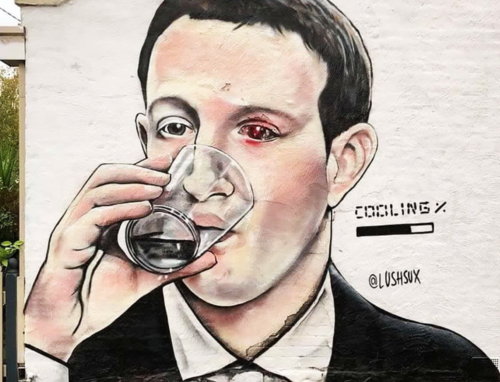Social media “outages” are generally few and far between, with Facebook’s last major one occurring in 2019 for almost—gasp!—a full day (obviously, a major blow to the typical wisp’s ego). And when Facebook has an outage, so, too, do its various tentacles, including Messenger, WhatsApp, Instagram and Oculus. For many, the most important of all these is Instagram—with boomers, conservative zealots and those who have few mediums to share their writing as a link on being the primary ilk to rely on a “dinosaur” of an apparatus like Facebook. Otherwise, were it not for Instagram being a major daily ego-stoker and stroker (which also happens to be key to many “influencers’” and companies’ livelihood), the sense of panic and withdrawal when an outage happens would not feel so profound among First World cunts with First World “problems.”
The fact that Facebook being “down” for a mere six-hour period could make international news above say, continued coverage of destitute Brazilians scavenging for food by way of picking at discarded animal carcasses, highlights just how much social media has benefitted from all of us being on its tit. Sucking at it addictively while also treating it as one of many parlor walls described in Ray Bradbury’s Fahrenheit 451. And as the minutes ticked away with the DNS all akimbo, one could imagine the sweat dripping down Mark Zuckerberg and his lackeys’ faces as they realized that they were giving people too much time to examine just how “dependent” (albeit illusively) they actually are on social media. How heroin-like it has become in the short time since it was begat. But, as the twenty-first century has emphasized, a short period of time can suddenly feel like eons now (see: 2020).
As the hours passed, many even found themselves starting to function “just fine” again—that is to say, like how they did in the “olden days.” Granted, there were those who simply chose to rely on Twitter as their methadone, with even TikTok, Snapchat and Gmail users reporting slow services on each of these “backup” apps of “communication.” That, to them, was preferable over trying to “commune” with something like “real life.” A concept that has become an increasing abstraction as this century has plodded along whilst emitting more and more digital horrors in its wake. One such “horror” has become, as we’ve seen evidenced by the “dark day” henceforth to be known as October 4, 2021, losing contact with the “real world” when we lose contact with the ersatz one provided by social media.
Whether or not the “outage” was “random,” or perhaps an excuse for Zuckerberg to offer up his users’ profiles for information-pillaging purposes to Russia or some such while no one could access it, is at one’s discretion. Whatever the case, it also seems oddly timed that it should happen on the day before whistleblower Frances Haugen was set to testify before Congress regarding what she saw going on at the social media juggernaut while working there as a product manager on the “civic integrity” team. It was almost as though Haugen, wanting to prove her point about the harm Facebook and its other acquired apps cause, cast some kind of spell on the entire enterprise that would shut it down to remind people of just how toxic and severe their dependency is.
Of course, writing about the need for a new kind of methadone for social media-substituting and then sharing it on one of said platforms is tantamount to writing an anti-capitalist book and selling it on Amazon. Or like celebrities’ posting pictures of themselves on Instagram with phone cases that say, “Social media seriously harms your mental health.” But such is the way of “coping” and “communicating” in lieu of any real solution to sidestepping the crack pipe that social media has become. Not just to “individuals” but even to small businesses that drum up sales by using these apps to draw customers in. And so, maybe October 4th was some kind of wake-up call/warning to people that it isn’t too late to wean themselves off the proverbial sauce. That we can, with enough hours spent off the glowing blue titty, learn to be human again. At the same time, that would assume there was any humanity left in us.






















